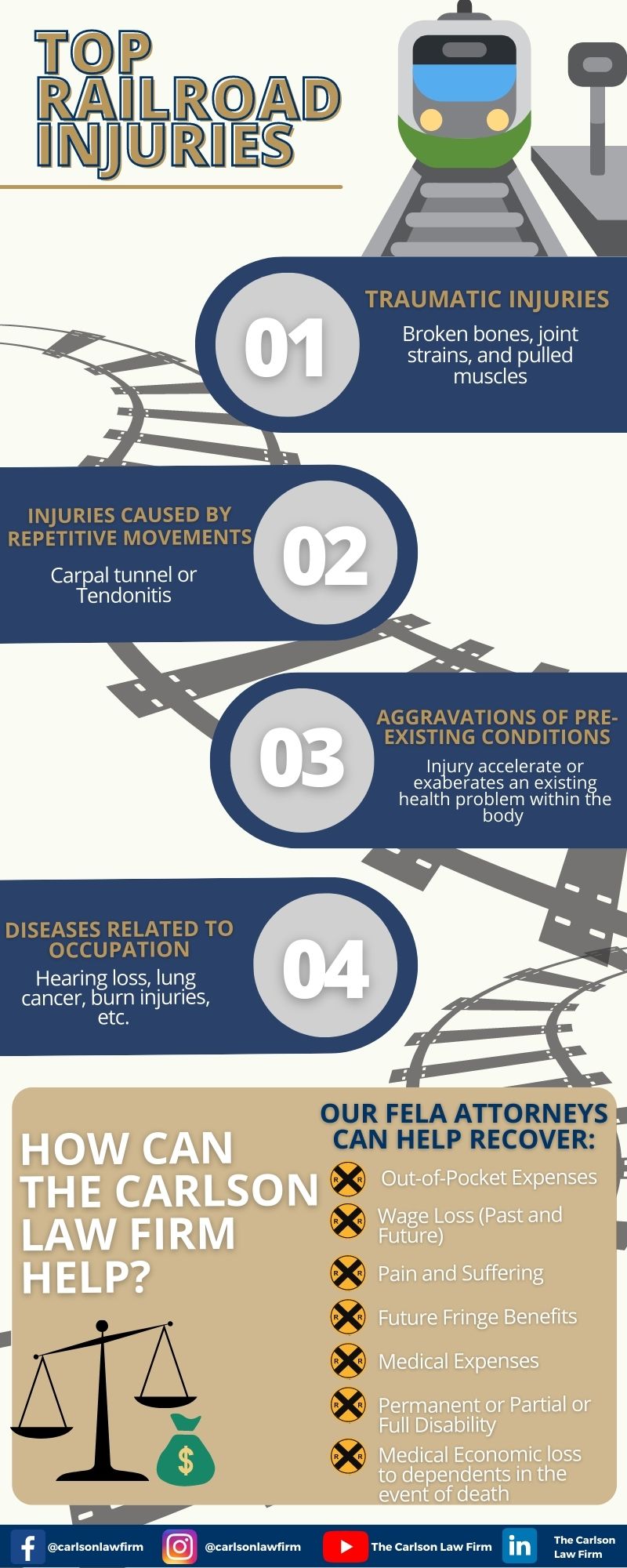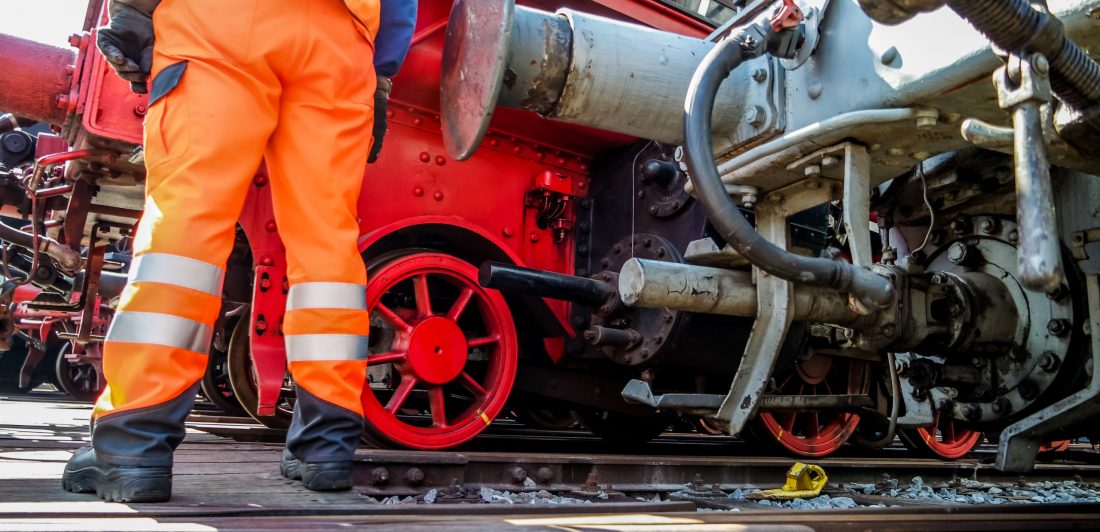It should come as no surprise that job-related injuries are common in the railroad industry. With the use of complex and heavy machinery and a cramped, less than optimal work environment, injuries are likely to happen. Fortunately, if a railroad worker suffers an injury, there is a form of compensation under the Federal Employers’ Liability Act. However, no financial payment can be made unless the individual can prove some negligence from the employer. Working with a FELA attorney can help you navigate these long and complex cases.
What is FELA?
Similar to workers’ compensation claims, the Federal Employers’ Liability Act (FELA) claims are designed to compensate injured workers for injuries suffered while working for employers. Passed in 1908, FELA holds that railroad companies have a responsibility to provide a safe workplace, properly maintain tools and equipment, implement safe work practices and ensure that the number of workers is always sufficient for the work to be done. However, this is where these two forms of compensation similarities end.
In a FELA claim, the injured employee is required to show that the employer wasn’t only negligent but that the negligence was also a cause of the injury. In comparison, this makes it harder for a FELA claim to prove and win than a worker's compensation claim.
What are my legal rights if I'm injured while working for the railroad?
Although there are various risks when working for a railroad, Congress enacted the Federal Employer's Liability Act (FELA) to help protect railroad employees and provide compensation when employees are injured while on the job.
Railroad employers have a duty to provide a reasonably safe work environment under FELA. Employers that fail to do so may be liable for a worker’s injuries that occur in the workplace. However, to receive benefits under FELA, a railroad employee must prove that the railroad was negligent in causing the employee’s injury. If the employee is unable to prove fault or negligence of the railroad company, the employee doesn't receive any benefits for an injury under FELA.
Violations of any of these conditions are sufficient to file a FELA compensation claim. If you were injured through your employer or coworker’s negligence, FELA gives you the right to sue.
What are the types of railroad injuries covered by FELA?
Railroad workers are exposed to the risk of bodily injury and death every day. Injuries can be excruciating, and workers may never fully recover from them. Additionally, a bill for emergency treatment and medical care can be a financial burden, and the worker is often forced out of work to recover.
FELA will generally cover four types of injuries that workers may experience:
- Traumatic injuries, including broken bones, joint sprains, and pulled muscles
- Injuries related to repetitive motions, like carpal tunnel or tendonitis
- Aggravations of pre-existing conditions, which happens when an injury accelerates or exacerbates an existing health problem within the body
- Diseases related to occupation, such as hearing loss, lung cancer, burn injuries, etc.
If I’m injured on the job, what should I do?
If you or a loved one has been injured while employed as a railroad worker, you must take the appropriate steps and precautions to ensure that your rights granted under FELA aren’t compromised.
Employer’s Injury Report
Immediately after your injury, you should report it to your supervisor and complete an injury report form to the extent to which your injuries allow you. It is advised that you be as thorough and honest about your injuries as you can be, including all possible causes, conditions, and factors that may have contributed to your incident. This report may come back up later in your claim.
Medical attention and treatment
Your employer may ensure that you seek medical attention and treatment after your incident, especially in emergency cases. Once you have received medical attention, it is best to seek an independent medical evaluation and any additional treatment from your personal doctor. Be honest and thorough about any pain or difficulties you are experiencing after the incident. Keep a record of bills and other documents about your medical care.
Personal Injury report
Although you will be completing a report for your employer, it is best to make a separate report for your own use that describes the accident and your injuries to the best of your ability. Your FELA attorney will use this report if you decide to hire one. In this report, as well as your employer’s report, you should describe the nature and extent of your injuries and the impact your injuries have had on your work and personal life. Be sure to include any witnesses to the incident.
Keep track of time off work
Make yourself a note of how much time you lost from work as a result of your injuries. It would help if you tracked all work missed on the day of the incident, the time during which you were unable to work because of the injury and the rehabilitation processes, and any work time missed for any medical appointments.
What happens if I receive treatment from a railroad doctor?
Most likely, your employer will have you receive treatment from a railroad doctor if you're in a work accident. However, you should seek medical treatment from your personal doctor.
The railroad’s legal team, including doctors and nurses, will spring into action immediately after the accident. Their goal is to minimize the financial liability for the railroad company. In other words, they want to reduce the value of your claim.
What are the damages that I can recover?
Although the damages that you can recover vary from case to case, some of the potential damages that may be recovered include:
- Out-of-Pocket expenses
- Wage loss (past and future)
- Pain and Suffering
- Future fringe benefits
- Medical expenses (past and future)
- Permanent partial or full disability
- Economic loss to your dependents in the event of a death
However, injured railroad workers must establish three factual requirements to recover damages under the FELA:
- The injuries must occur in the course and scope of employee's work during the railroad. Injuries sustained don't have to occur on railroad property, as long as they occur “on the job.”
- The railroad must be engaged in interstate commerce between two or more states.
- The railroad must have caused or in some way contributed to the injuries sustained by the railroad employee.
Are there time limitations on bringing the claim?
The statute of limitations for filing a FELA lawsuit is set by federal law. The time period you may report your incident is within three years from the date of your injury. If you don’t bring up this lawsuit within that time frame, the court will most likely determine that you’re not entitled to receive any compensation.
Depending on the nature of your injury, it may be hard to determine the date on the statute of limitations. However, the general rule is that the three-year statute of limitation begins when you know, or should’ve known, that you have (1) suffered an injury and (2) that the injury is work-related.
What if the accident was partly my fault?
Even if you were negligent or your negligence played a role in the accident, that shouldn’t stop you from pursuing a claim or collecting damage compensation under FELA. However, the court will consider your negligence when deciding on your payment for your injuries.
At The Carlson Law Firm, we can help
The railroad’s legal team will begin working as soon as you are injured. If you or a loved one has suffered a railroad injury, contact The Carlson Law Firm today. Here at The Carlson Law Firm, we have FELA attorneys that have industry knowledge to give you an advantage with your FELA case. Call us today for a free consultation.




